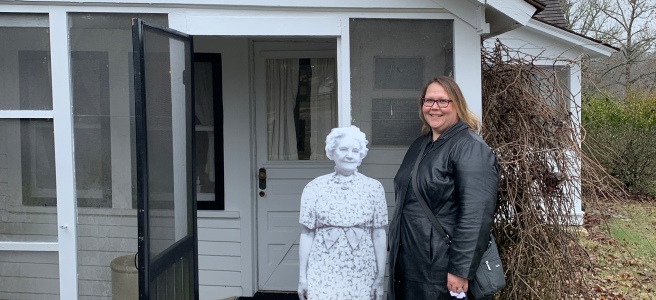I’ve been mulling over an epiphany I had a couple of weeks ago, about fandom and my place in it.
It will come as no surprise to some that I am, apparently, a professional fan. However, it was a surprise to me when I realized it.
First, it’s no surprise to many to find that I am a lifelong fan of the works of Laura Ingalls Wilder. My first book, in fact, is an edited collection of the literary journalism of Rose Wilder Lane. I subscribed to Little House newsletters from the home sites in Laura’s world when I was old enough to use my babysitting money to do so, and my first independent road trip, the week I turned 18, was to see the Pepin and Walnut Grove sites firsthand.
Like many “bonnetheads,” I made an effort to learn how to do everything Laura did in her books. I learned to sew, to cook over an open fire, to churn butter, and to make bread from ground wheat and sourdough starter. I played “Little House” for endless hours with my cousins and friends, almost always as Mary, the oldest, because I had blond hair. As an adult, I bought each new book that came out about her life, and as a graduate student, I used her life experiences and writings to frame my own historic research.
I’ve even cosplayed as Laura or Rose, on occasion.
But somehow, that didn’t translate into fandom for me. It simply was. The work I’ve done with Laura and Rose has become what I’m best known for as a scholar, and it’s led to a degree of me being recognizable in public. The BBC interview I gave when Pioneer Girl, the annotated edition, came out, contributed some name recognition internationally that was cool and weird at the same time. And yet, I still hadn’t connected the dots.
It’s ironic, because I have actually researched fan culture. For my master’s thesis, I explored fan culture and the emerging communities online that supported various subgroups of it. I was fascinated by the collectives that had decided to take ownership of varied media, particularly Lois and Clark, and “correct” the deficiencies fans had identified in the original work’s plots. I finished and defended my thesis in 2001, just a few years after the World Wide Web had entered homes and before social media became a dominating force.
I spent a long time trying to see the thread that binds that research to the work I’ve done in history, and I realized, finally, and with help from the Michael Sheen fandom, of all things, that what ties everything I’ve ever done as a scholar together is fan culture.
So, there lies the epiphany. I’m still exploring fandom and my place in it. There’s something teasing me with notions of celebrity, familiarity, and cognitive dissonance that I’ve yet to articulate. When I’ve figured it out, I’ll write more about it.
(And yes, I’ve become a big fan of Michael Sheen’s work. Especially in Good Omens. It’s brilliant. You should go check it out.)
(And yes, I really am that clueless about my own significance in some ways, and require metaphorical big slaps in the face to “get it.”)


